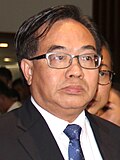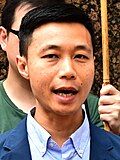19 December 2021 | |||||||||||||||||||||||||||||||||||||||||||||||||||||||||||||||||||||||||||||||||||||||||||||||||||||||||||||||||||||||||||||||||||||||||||||||||||||||||
All 90 seats to the Legislative Council 46 seats needed for a majority | |||||||||||||||||||||||||||||||||||||||||||||||||||||||||||||||||||||||||||||||||||||||||||||||||||||||||||||||||||||||||||||||||||||||||||||||||||||||||
|---|---|---|---|---|---|---|---|---|---|---|---|---|---|---|---|---|---|---|---|---|---|---|---|---|---|---|---|---|---|---|---|---|---|---|---|---|---|---|---|---|---|---|---|---|---|---|---|---|---|---|---|---|---|---|---|---|---|---|---|---|---|---|---|---|---|---|---|---|---|---|---|---|---|---|---|---|---|---|---|---|---|---|---|---|---|---|---|---|---|---|---|---|---|---|---|---|---|---|---|---|---|---|---|---|---|---|---|---|---|---|---|---|---|---|---|---|---|---|---|---|---|---|---|---|---|---|---|---|---|---|---|---|---|---|---|---|---|---|---|---|---|---|---|---|---|---|---|---|---|---|---|---|---|
| Opinion polls | |||||||||||||||||||||||||||||||||||||||||||||||||||||||||||||||||||||||||||||||||||||||||||||||||||||||||||||||||||||||||||||||||||||||||||||||||||||||||
| Registered | 4,472,863 (GC) [1] | ||||||||||||||||||||||||||||||||||||||||||||||||||||||||||||||||||||||||||||||||||||||||||||||||||||||||||||||||||||||||||||||||||||||||||||||||||||||||
| Turnout | 1,350,680 (30.20%) | ||||||||||||||||||||||||||||||||||||||||||||||||||||||||||||||||||||||||||||||||||||||||||||||||||||||||||||||||||||||||||||||||||||||||||||||||||||||||
| |||||||||||||||||||||||||||||||||||||||||||||||||||||||||||||||||||||||||||||||||||||||||||||||||||||||||||||||||||||||||||||||||||||||||||||||||||||||||
 | |||||||||||||||||||||||||||||||||||||||||||||||||||||||||||||||||||||||||||||||||||||||||||||||||||||||||||||||||||||||||||||||||||||||||||||||||||||||||
| |||||||||||||||||||||||||||||||||||||||||||||||||||||||||||||||||||||||||||||||||||||||||||||||||||||||||||||||||||||||||||||||||||||||||||||||||||||||||
The 2021 Hong Kong Legislative Council election was a general election held on 19 December 2021 for the 7th Legislative Council of Hong Kong. [2]
Contents
- Background
- Election postponement
- Crackdown on opposition
- Electoral overhaul
- Pro-democrats' boycott
- Local parties
- Overseas calls
- Contesting parties and candidates
- Pro-Beijing camp
- Independent democrats
- Others
- Retiring incumbents
- Opinion polling
- Voting intention
- Voting arrangements
- Border polling stations
- Free transportation on election day
- Results
- Votes summary
- Seats summary
- Incumbents defeated
- Results breakdown
- Criticism
- Domestic
- International
- Aftermath
- Notes
- See also
- References
- External links
Under the drastic Beijing-imposed electoral overhaul, the composition of the council was altered to reduce and limit popular representation along with ensuring a pro-Beijing majority. The total number of seats was increased from 70 to 90 seats, with the directly elected geographical constituencies (GCs) reduced from 35 to 20 seats, the trade-based indirectly elected functional constituencies (FCs) staying at 30, and the additional 40 seats being elected by the 1,500-member Election Committee. The 5 directly elected District Council (Second) FC seats were eliminated. In total, the directly elected seats were reduced from 57.1% to 22.2%. [3] [4] [5] Opposition pan-democratic candidates were banned and either arrested or forced into exile. As a result of these changes the election was considered to be "patriots-only" and by numerous organizations to be neither free nor fair. [6] [7] [8]
Originally scheduled on 6 September 2020, Chief Executive Carrie Lam unprecedentedly postponed the election citing the COVID-19 pandemic. [9] That abruptly halted the momentum of the pro-democrats who campaigned for a "35+" majority, building from the historic 2019 anti-government protests and the pro-democracy landslide in the November District Council election. [10] Subsequently, the government began to purge the opposition with the installation of the Hong Kong national security law. By mid 2021, almost all leading pro-democracy legislators and activists had either been arrested, imprisoned or forced to exile, with several major pro-democracy organisations, trade unions and media outlets disbanded by means of intimidation.
Despite efforts by the government to boost voter turnout by offering free transport and establishing polling stations at the Chinese border, the election had the lowest turnout of any Legislative Council election in history. [11] [12] The number of blank or invalid votes also set a record high. [13] These issues were blamed on a lack of interest in the election amongst pro-democracy Hongkongers. [14]
89 out of 90 elected members were the pro-Beijing establishment, with one sole moderate member in the mix represented by Third Side's Tik Chi-yuen. [15] The traditional flagship pro-Beijing party Democratic Alliance for the Betterment and Progress of Hong Kong (DAB) emerged as the biggest winner with 19 seats, by securing a seat in each of the ten geographical constituencies. [16]












